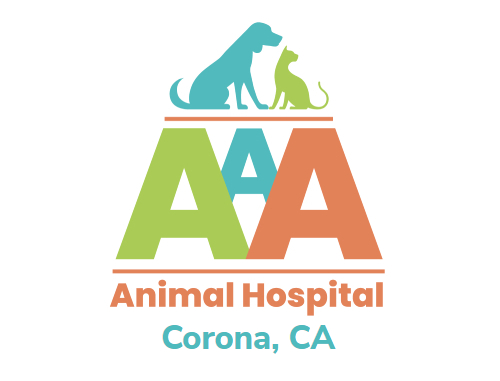Pet Vaccinations
At AAA Animal Hospital our wellness and vaccination programs are designed to prevent disease and prolong the lives of your companion animals.
Pet Vaccinations
We believe vaccinations are an important part of your pet’s wellness plan. Vaccines have been developed to protect pets against serious life-threatening diseases such as parvovirus, distemper and rabies.
Disease prevention is always less hazardous to your pet’s health and ultimately less costly than dealing with the cost of a preventable disease. During your pet’s annual physical examination, we touch base with you regarding your pet’s health and ask about changes in your pet’s lifestyle. We will recommend a vaccine protocol that is most suited to your particular pet. The decision to vaccinate will be based on a risk-benefit assessment for each vaccine for each pet.
According to the World Small Animal Veterinary Association, AAHA Guidelines there are two broad categories for vaccinations;
- Core vaccines are vaccines that all pets, regardless of circumstance should receive. Core vaccines protect animals from severe, life-threatening diseases that have a global distribution.
- Non-core vaccines are vaccines that should be given to our pet whose lifestyle or local environment places them at increased risk of contracting specific infections.
How do vaccinations work?
Vaccines contain modified viruses, an agent that resembles a disease-causing microorganism and improves the immunity in two parts: production of antibodies and stimulation of body’s immune systems to the particular disease. The two parts of immune system will react quickly to destroy the disease-causing agent, if later exposed to the disease.
Kittens and puppies obtain immunity from their mother’s milk however this wanes after 6 to 20 weeks of age. Therefore, a series of vaccines are given starting at 8 weeks of age and “booster” shots every 3-4 weeks until immunity is high, which is normally at 16 weeks. Second vaccine will stimulate greater response if it is given after 4 weeks from prior vaccine.
Does my pet need regular booster vaccination?
Regular “booster” (annual) vaccination is recommended to ensure continuous immunity from disease, as protection from vaccine gradually declines over time.
Currently, the relative issue of vaccinating annually after the first year of puppy/kitten shots is still under research within veterinary medicine, as the duration of immunity of each vaccine is not presently known.
While there is an option to have a blood test to assess pet’s antibody level, the level of immunity currently provided by pet’s immune system cannot be tested. Therefore, until more is researched, the frequency of vaccination will vary accordingly. Ask your veterinarian about the risk of viral and bacterial diseases in your area and the need for regular boosters, whether annual or every 2 to 3 years.
When deciding in the best interest for your pet, please remember pets age faster than people and, in addition, they will try to disguise their pain and illness as long as possible. With no outward signs, the disease will go unnoticed until it’s quite advanced. Therefore, regular vaccination and annual physical examination will go a long way to ensure their health and to detect early signs of organ dysfunction and illness. Early treatment can not only increase their life span but also improve their quality of life.
What disease are vaccines available for?
Canine
- Rabies: is a fatal, zoonotic disease affecting the brain and neurological system.
- Rabies is a core vaccine. It should be given at 12 weeks, and then annually thereafter.
- Canine distemper is a virus that can affect several systems in the body including the respiratory, gastrointestinal and neurological system.
- DHPP (distemper, hepatitis/adenovirus & parvovirus & Parainfluenza)-This core vaccine should be given at 8 weeks, 12 weeks, and sometimes requires a booster at 16 weeks. The booster requirement in future may be annually or up to every 3 years, depending on your pet’s lifestyle, exposure, and the vaccine brand that is being used.
- Hepatitis
- Parainfluenza
- Parvo virus: is a highly contagious, potentially lethal disease causing severe diarrhea in dogs.
- Leptospirosis : is a bacteria that is shed in the urine of infected dogs, humans, wildlife, such as skunks and raccoons, and livestock. Dogs can become infected by contact with contaminated water, soil or animal urine and infection can cause life threatening kidney and/or liver failure.
- If your dog enjoys drinking out of puddles, creeks, rivers etc. this vaccine is recommended. The leptospirosis bacterium is spread through contaminated animal urine via mucous membranes (mouth, nose, eyes). Like rabies, leptospirosis can infect humans, which is why this is an important vaccine. This vaccine needs boosted yearly.
- Corona virus: Canine enteric coronavirus is a highly contagious intestinal infection seen mostly in young puppies. It is spread by oral contact with infected feces and causes diarrhea that is self-limiting in adult dogs but can be more severe in young puppies
- Bordetella (aka kennel cough): is a vaccine that protects dogs against contracting infectious tracheobronchitis. It is recommended for dogs that have regular contact with other dogs such as those that go regularly to a dog walker, a boarding facility, and dog park or obedience class. Bordetella is very contagious, easily transmitted (via air or direct contact), and hard to kill in the environment
- This vaccine is highly recommended..This vaccine is also required for most dog boarding facilities. Bordetella needs to be updated annually, and is usually given around 12 weeks of age.
- Lyme (Borrelia): Lyme disease, also known as Lyme borreliosis, is a bacterial illness that can be transmitted to humans, dogs, and other animals by certain species of ticks.
- Two initial doses, 2 to 4 wk apart, may be administered as early as 8 or 9 wk of age, Where risk of exposure is sustained, administer a single dose 1 yr following completion of the initial 2-dose series, then annually thereafter.
- Canine Influenza: Dog flu, or canine influenza virus, is an infectious respiratory disease caused by an influenza A virus, similar to the viral strains that cause influenza in people. There are two known strains of dog flu found in the United States: H3N8 & H3N2
- Two initial doses, 2 to 4 wk apart, are required. The first dose may be administered to dogs 6 to 8 wk of age or older. Where risk of exposure is sustained, administer a single dose within 1 yr following completion of the initial 2-dose series, then every year thereafter.
Feline
- Rabies is a fatal, zoonotic disease affecting the brain and neurological system.
- Rhinotracheitis
- Calici virus
- Panleukopenia
- Feline Leukemia: is a virus that causes a variety of symptoms including cancers, anemia and immunosuppression, leading to infections with other diseases. Cats contract the virus from direct contact with another infected cat, usually through a cat bite, grooming or sharing food and water dishes. The feline leukemia vaccine is recommended for cats that go outdoors, potentially contacting with other cats who may be infected. It is also recommended for cats in multiple cat households where the introduction of new cats is common.
- FelV is a non-core vaccine and is recommended for specific patients. These patients are usually young cats and those going outdoors or living in multi-cat households.
If you have any questions about vaccination or would like to schedule an appointment, feel free to contact us today at (951) 371-7117.

